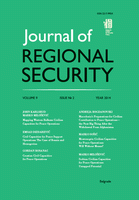Montenegrin Civilian Capacities for Peace Operations: Will Without Means?
Montenegrin Civilian Capacities for Peace Operations: Will Without Means?
Author(s): Marko ŠošićSubject(s): Politics / Political Sciences
Published by: BCBP Beogradski centar za bezbednosnu politiku
Keywords: civilian capacities; Montenegro; peacekeeping; peace support missions; NATO
Summary/Abstract: The question that this paper sets outs to answer is whether Montenegro is prepared for participation in peace support operations with civilian capacities. Montenegro currently participates in four peace support missions under UN, NATO and EU auspices, almost exclusively with armed troops. The police is starting to deploy its officers to missions, while the civil protection units have not yet been formed and the representatives of other institutions have so far not participated in any missions. The key finding of this paper is that Montenegro is at the very start of developing its policy in the area of civilian participation in the peace support missions. Political will to engage in developing CIVCAP exists. However, it does not seem to stem from an inherent need of the country or to be a choice made on the basis of evaluation of hitherto policy in this area. Montenegro has started to conduct activities aimed at establishing CIVCAP exclusively as one of the specifically outlined steps in the NATO integration process. The incentive to pursue this goal is not yet strong and the process of developing CIVCAP has not yet been institutionalized. The legal framework, though regulating the military participation in relatively elaborate detail, does not deal with civilian capacities at all. The concept of CIVCAP suitable for Montenegro is still being debated in the administration with no clear idea on what direction to take and very little knowledge about the comparative experiences in this regard. The process is quite challenging for a small state with limited capacities and strong donor support for initial steps is crucial for its success.
Journal: Journal of Regional Security
- Issue Year: IX/2014
- Issue No: 2
- Page Range: 145-164
- Page Count: 20
- Language: English

